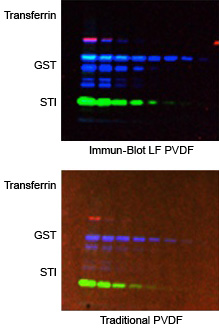
Hercules, CA — October 3, 2011 —Bio-Rad Laboratories, Inc. announces the launch of its Immun-Blot LF (low fluorescence) PVDF membranes, protein blotting membranes that are optimized for fluorescent and multiplex fluorescent applications. The membranes offer high signal-to-background ratio, low autofluorescence, and superior protein retention to maximize blot detection sensitivity and enable downstream quantitation.
There are two primary types of protein blotting membranes used in Western blotting applications: Nitrocellulose and PVDF (polyvinylidene fluoride). While both membrane types are suitable for colorimetric and chemiluminescent detection, their high autofluorescence and lower signal-to-background ratios are not suitable for fluorescent detection.
Immun-Blot LF PVDF membranes are a low fluorescent alternative specifically designed for fluorescent immunoblotting and detection in the visible light (Red/Green/Blue) spectrum. Immun-Blot LF PVDF membranes produce highly sensitive and quantitative results due to superior signal-to-background ratios, which are higher than low fluorescence membrane solutions (Bulletin 6116) and are three times higher than nitrocellulose and conventional PVDF.
Key Features
- Low autofluorescence and high signal-to-background ratio — produces a stronger signal, more accurate protein quantitation, and higher quality images
- Superior protein retention — offers binding capacity of 300 µg/cm2 and improves the ability to capture more proteins, especially low-abundance proteins
- Precut membrane and filter paper sets — saves time and eliminates excessive membrane handling and potential contamination
Immun-Blot LF PVDF membranes are compatible with any imager possessing visible RGB excitation channels, including Bio-Rad's new ChemiDoc™ MP imager, which allows researchers to visualize proteins at every stage of their blotting experiment when paired with Bio-Rad’s proprietary Stain-Free technology. The membranes are also compatible with a wide range of fluorescent labels such as DyLights, Q-Dots and Alexa fluorophores as well as colorimetric and chemiluminescent detection methods.
For product details visit http://bit.ly/immunblotlfpvdf.
About Bio-Rad
Bio-Rad Laboratories, Inc. (NYSE: BIO and BIOb) has remained at the center of scientific discovery for more than 50 years, manufacturing and distributing a broad range of products for the life science research and clinical diagnostic markets. The company is renowned worldwide among hospitals, universities, and major research institutions, as well as biotechnology and pharmaceutical companies for its commitment to quality and customer service. Founded in 1952, Bio-Rad is headquartered in Hercules, California, and serves more than 100,000 research and industry customers worldwide through its global network of operations. The company employs more than 6,800 people globally and had revenues exceeding $1.9 billion in 2010. For more information, please visit http://www.bio-rad.com.
For more information contact:
Jeff Xu
Bio-Rad Laboratories, Inc.
510-741-6398
jeff_xu@bio-rad.com
Lawreen Asuncion
Bio-Rad Laboratories, Inc.
510-741-4789
lawreen_asuncion@bio-rad.com
Ken Li
Chempetitive Group
312-997-2436 x 109
kli@chempetitive.com
